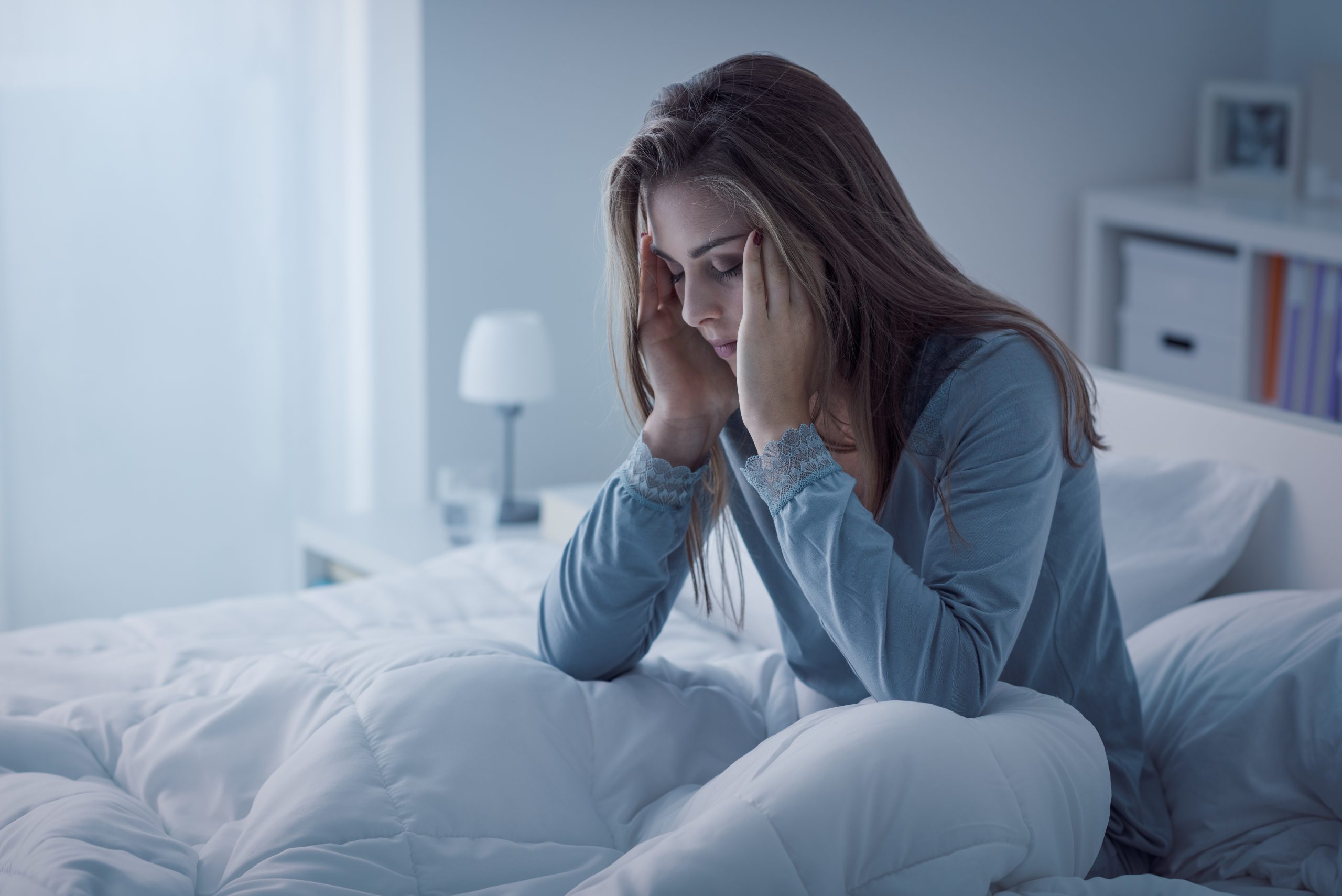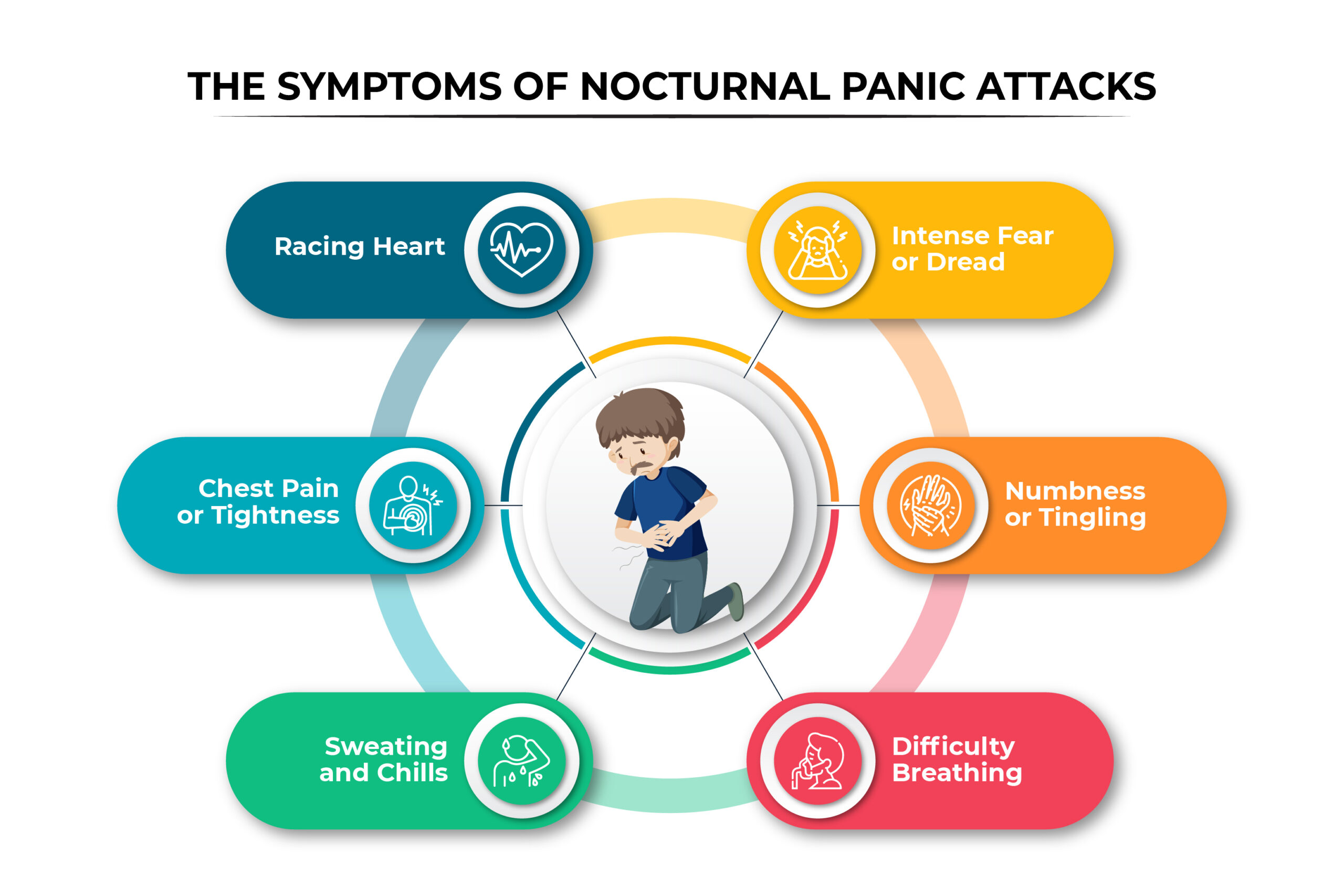Sudden jolts or intense fear during sleep can leave you feeling panicked. However, there are strategies to manage nighttime anxiety and improve sleep quality.
Ever wake up in a cold sweat, heart pounding as if you’ve just finished running four blocks?
Maybe those nighttime jitters aren’t because of nightmares or vivid dreams.
These mini panic attacks, sometimes called hypnic jerks, can leave you feeling seriously on edge—also known as nocturnal panic attacks.

Mini panic attacks are miniature versions of regular panic attacks, but they happen right as you’re trying to fall asleep. You find your heart racing, you can’t breathe, and your mind’s running wild with worries.
The reason could be anything and everything—from stress, fear of something upcoming, or to underlying health conditions.
But you don’t have to worry, because it’s something very common. A study from 2016 tells us around 60% to 70% of people suffer from mini panic attacks at night.
Let’s explore strategies for coping with these mini panic attacks and ensuring a peaceful slumber.
Coping Techniques For the Moment
Sure, there are many remedies for treating the condition in the long run. But here are some simple things you can do right away to calm down:
Take Deep Breaths
Imagine you’re smelling a beautiful flower. Breathe in slowly and deeply through your nose for 4 counts, hold for 4 counts, and then slowly release the air through your mouth for 4 counts. Repeat this a few times until you feel calmer.
Relax Your Muscles
Start at your toes and tense them up for a few seconds, then release. Slowly work your way up your body, tensing and releasing each muscle group. This helps to loosen tension and signal to your body it’s time to relax.
Focus on Your Senses
Is there a soft blanket nearby? Feel its texture against your skin. Listen to calming music or nature sounds. Light a scented candle with a relaxing smell like lavender. Engage your senses to distract your mind from anxious thoughts.
Strategies to Calm Nighttime Anxiety
Mini panic attacks must not be taken casually. Thus, you can follow the following steps to prevent future panic attacks in the long run:
Set A Sleep Schedule
Your body loves routine, so go to bed and wake up around the same time each day, even on weekends. This helps regulate your sleep-wake cycle and makes it easier to fall asleep and stay asleep.
Wind Down For Bedtime
Create a calming ritual before bed. Take a warm bath, read a book, listen to calming music, or do some gentle stretches. Avoid screens like phones and TVs for at least an hour before bed as their blue light can interfere with sleep.
Manage Your Stress
Feeling stressed can worsen sleep and contribute to panic. Try relaxation techniques like meditation, yoga, or deep breathing. Regular exercise can also help reduce stress and improve sleep quality.
You can indulge in:
- Brisk walking: This is a simple and accessible activity that gets your heart rate up and releases endorphins, the body’s natural mood boosters.
- Running: Running provides a more intense workout and can be especially helpful for releasing pent-up energy and clearing your head.
- Bodyweight exercises: Simple bodyweight exercises like squats, lunges, push-ups, and planks can be done anywhere with no equipment.
- Tai Chi: This exercise involves slow, flowing movements that coordinate breath and body.
Limit Caffeine And Alcohol
While they may seem relaxing, caffeine and alcohol can disrupt your sleep and make panic more likely. Avoid them in the late afternoon and evening.
Get Help When You Need It
If self-help techniques aren’t enough, don’t hesitate to seek professional help. Therapists can teach you coping skills and address underlying anxiety issues. Your doctor can also rule out any medical conditions contributing to your sleep problems.
Establish a Pre-Bedtime Ritual
To help calm your mind before sleep, it’s best to steer clear of screens and engage in gentle relaxation exercises instead. This action helps balance your nervous system response, making it easier to let go of that panic attack when falling asleep.
Journaling Before Bed
If your mind’s racing, jotting down your thoughts before bed can help release the tension. By putting your worries on paper, you’re giving them a place to rest outside your mind.
Another way to keep nighttime anxiety at bay is to write about things you’re grateful for or focus on positive aspects of your day. Shifting your focus can help create a more peaceful mindset before you hit the sheets.
Choose A Light Snack
A light snack can do more than satisfy your stomach. It helps stabilize your blood sugar levels, which can play a part in reducing anxiety. Skip the caffeine, though—it can amp up anxiety and make falling asleep challenging.
Cutting back on caffeine and liquids before bed is a smart move. Too much can keep you up or wake you up, triggering that rush of anxiety when falling asleep.
Engage In Relaxing Activities
When sleep seems elusive, don’t just lie there. If anxiety stops you, getting out of bed might be better. Engaging in simple, soothing activities can help redirect your thoughts and calm your nerves—such as listening to music or watching a Slice of Life anime.
Doing something light and calming can take your mind off those mini panic attacks when falling asleep. Remember, it’s about gentle engagement, not stimulating your brain further.
Why Does Nighttime Anxiety Occur?
There are several reasons as to why you might suffer from nighttime anxiety. Here are some of the most common ones:
Lack Of Distractions
At night, with no distractions around, those nagging worries can feel louder than ever. Your brain gets a free stage to replay concerns and create a rush of anxiety when falling asleep.
Fatigue
Your ability to handle worries can take a hit when you’re tired. Your brain might struggle to put those anxious thoughts in perspective due to fatigue.
Anxiety
Anxious thoughts can mess with your sleep, making you tired and less equipped to tackle future mini-panic attacks when falling asleep. It’s like a loop that keeps getting tighter.
The Symptoms Of Nocturnal Panic Attacks
While panic attacks can strike anytime, day or night, those occurring during sleep hold unique challenges.
Here’s a breakdown of the common symptoms that might signal a nocturnal panic attack:

- Racing heart: Your heart might pound rapidly, leaving you feeling breathless and shaky.
- Chest pain or tightness: You may experience discomfort or pressure in your chest, mimicking the feeling of a heart attack.
- Sweating and chills: Sudden shifts in body temperature, like excessive sweating or chills, can be alarming and contribute to anxiety.
- Difficulty breathing: You might feel like you can’t catch your breath, leading to hyperventilation and increased panic.
- Numbness or tingling: Strange sensations like pins and needles in your hands or feet can be unsettling and fuel the panic response.
- Intense fear or dread: A sudden feeling of overwhelming fear or impending doom can be terrifying and disorienting.
Treatment Options for Nighttime Anxiety
If coping strategies don’t work, you can opt for a proper treatment for your nighttime anxiety. Here are some options to consider:
Work with A Therapist
Dealing with nighttime anxiety is often easier with a therapist’s guidance. They can offer coping strategies and provide professional support to navigate those signs of panic attack while sleeping.
Therapists tailor their methods to suit your needs. It’s like having a personalized toolkit to handle panic attacks when falling asleep.
Consider Medication
If your nighttime anxiety is overwhelming, talking to a doctor about anxiety medication could be helpful. Your doctor can guide you through the options and discuss their potential benefits.
Remember, what works for one person might not work for another. Finding the right fit is important, so your doctor will help you navigate the maze of options and choose the best approach for you.
Recognizing The Connection Between Anxiety and Sleep
Anxiety and sleep have a two-way connection. If anxiety keeps you up, it can affect your sleep. And if lack of sleep happens, it can make anxiety worse. It’s like a loop that feeds into itself.
Dealing with anxiety and sleep isn’t just about getting a good night’s rest. It’s about your overall well-being. Taking care of both aspects—addressing panic attack in sleep and panic attacks while falling asleep—can lead to a happier, calmer you.
Seeking Professional Help
There’s no shame in seeking help. If those mini panic attacks when falling asleep are causing distress, know that reaching out for assistance is a positive step. It’s about your well-being, not any stigma.
If nighttime anxiety is taking a toll on you, consider talking to a mental health professional. They’re equipped to provide guidance and tools to manage panic attacks while falling asleep, tailoring their approach to your needs.
Sometimes, panic attacks when falling asleep could be tied to underlying sleep disorders. If that’s the case, seeking a medical evaluation can help identify and address any sleep-related issues contributing to your nighttime anxiety.
Carry Your Personal Chill Kit
A fun way to unwind yourself and keep your anxiety levels down is to create your personal chill kit. It’s nothing but a bunch of things to help you relax and feel calm.
Here’s what you’ll need:
- Squishy things: Stress balls, squishy toys, or anything fun to squeeze and hold.
- Sniffable stuff: Calming essential oils like lavender or chamomile. Put a few drops on a cotton ball or tissue and breathe deep.
- Soothing sounds: Relaxing music playlists, nature sounds, or even white noise can help you chill.
Add anything else that makes you feel good! Maybe a cozy blanket, a funny picture, or a special book.
Wishing You Sweet Dreams
Nighttime anxiety, with its mini panic attacks when falling asleep, is more common than you might think. Many people experience this challenge, and you’re not alone in facing it.
If you’re struggling with panic attacks while sleeping or those mini panic attacks when falling asleep, remember that there are coping strategies and professionals ready to help. You can take steps towards better sleep and a calmer mind.
By addressing nighttime anxiety, you’re not just improving your sleep quality. You’re enhancing your overall well-being. Embrace the tools and support available, and take those positive steps toward better nights and brighter days.
Quick Tips To Cope Up With Mini Panic Attacks
- Breathe Deep: Take slow, deep breaths, counting to 4 on the inhale and 6 on the exhale. Repeat until you feel calmer.
- Ground Yourself: Focus on your senses. Name 5 things you can see, 4 things you can touch, 3 things you can hear, 2 things you can smell, and 1 thing you can taste.
- Relax Your Muscles: Tense and release different muscle groups, starting from your toes and working up. Hold for a few seconds, and then let go.
- Soothing Sounds: Listen to calming music, nature sounds, or white noise to distract your mind and ease anxiety.
- Positive Self-Talk: Remind yourself that you’re safe, this feeling will pass, and you’ve handled tough situations before.


